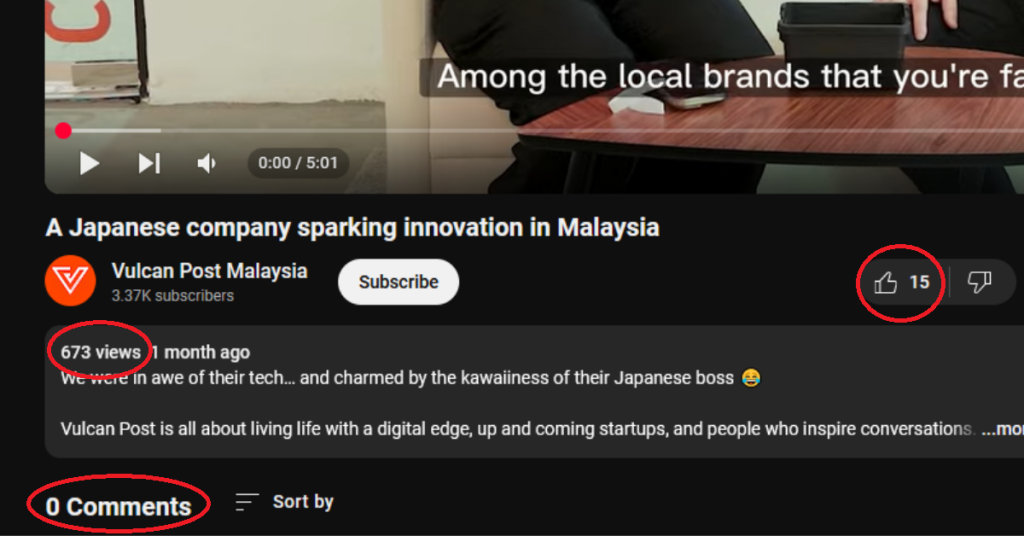Disclaimer: This article is for general informational purposes only and is not meant to be used or construed as legal advice in any manner whatsoever. All articles have been scrutinised by a practising lawyer from Tristan & Partners to ensure accuracy.
The “silent majority” is a concept in politics that refers to how the largest portion of a country’s population actually does not involve themselves in politics.
More recently, however, the term has taken on a more general meaning, encompassing a broader spectrum. Now, it can also refer to the fact that the loudest people in the room expressing their opinions are usually in the minority.
Take social media, for example. A YouTube video may have a million views, but how many people go out of their way to actually like the video?
For extra context, just a 3.75% to 4% view-to-like ratio is what’s considered ideal. Meaning that, if we’re being generous, one can expect about 40,000 likes in this scenario.
And as for comments? That coveted “golden ratio” drops to about 0.5%. Just 5,000 comments.

Reviews for businesses and products tend to follow a similar pattern. And that’s not exactly a good thing when reviews tend to be the first thing people turn to when they’re deciding what to spend their hard-earned money on.
I don’t think it’s a stretch to say that nobody wants to enter a restaurant with a gorgeous exterior but horrendous service, bland food, and extortionate prices. Or that what’s shown on the box ends up being different from the actual product.
But whereas social media accounts can be blocked and ignored with comments deleted, reviews have to contend with a certain “risk” when dealing with especially sensitive business owners.
And that’s a defamation lawsuit.
What does it mean?
 Image Credit: The Kuala Lumpur Bar Committee
Image Credit: The Kuala Lumpur Bar CommitteeIn law, defamation refers to the act of making a false statement on any person, business, or organisation that ends up damaging their reputation.
Statements made in “permanent form,” such as texts, videos, and radio broadcasts, are referred to as “libel.”
“Transient” or “temporary” statements where there is no referable record, meanwhile, constitutes as slander. Take something said in the moment for example.
Here in Malaysia, laws pertaining to defamation fall under the aptly named Defamation Act 1957.
However, the act only provides, among others, situations where an action for slander can be pursued without the need to prove special damages, and the application of defences such as justification, fair comment, and qualified privilege.
It notably does not cover what amounts to defamatory statements.
So, then, can any criticism you make be leveraged against you as defamation?
Well, that’s up to the court to decide on a case-by-case basis.
Suing & defending
In order to establish a claim for defamation, it must first be proven that the statement made does in fact refer to the plaintiff, i.e. the one who initiated the lawsuit.
Secondly, it must also be shown that the statement made was defamatory in the first place. And the two ways this can be done are through interpretation via natural and ordinary meaning or by innuendo.
Statements that are direct and can be taken at face value would fall under interpretation by natural and ordinary meaning.
To explain innuendo, here is an example:
Person A makes a statement on social media saying, “The items at my office desk have been going missing. It must be the person that sits next to me who has been taking them. Don’t tell me such a person can’t even afford to buy staples?”
The words used by Person A can be implied to mean that the person who sits next to A is a poor person, is not financially capable, or is a thief.
Though not direct, this can be taken as defamatory, thus giving the person sitting next to Person A grounds for a lawsuit.
The last criteria is to prove that the defamatory statement was published.
But whether or not the lawsuit will be won, will depend on the defendant’s defence.
 Image Credit: The Kuala Lumpur Bar Committee
Image Credit: The Kuala Lumpur Bar CommitteeWhen you’re being sued for defamation, the most common defences that you can take up include the following:
| Defence | Criteria |
| Justification | The defendant has proof that their statement is true. |
| Fair Comment | The statement made was: – an expression of opinion, not a statement of fact – based on true facts – fair and accurate – in the interest of the public |
| Absolute Privilege | The statement was published in certain settings or situations, such as: – a judicial proceeding – a parliamentary proceeding – a police report or statement |
| Qualified Privilege | – The defendant had a legal, moral, or social duty to make the statement – It was in the interest of the plaintiff to receive the statement |
| Reynold’s Privilege | – The statement made was done so in public interest – The defendant acted reasonably in publishing their statement, known as the “responsible journalism test” |
Fair comment and qualified privilege, however, will fail if it can be proven that the statement made was done so in malice.
As far as the legal world is concerned, malice can be defined as the intention to cause harm without justification or excuse.
“So long as a person believes in the truth of what he says and is not reckless, ‘malice’ cannot be inferred from the fact that his belief is unreasonable, prejudiced or unfair,” explained law firm Carter-Ruck.
As the saying goes…
 Image Credit: Malacca Bar Committee
Image Credit: Malacca Bar CommitteeDamages can only be claimed by the plaintiff should they be proven innocent with concrete evidence that they have incurred some sort of loss from the whole ordeal.
Carter-Ruck states that the amount will be determined by the court based on factors including but not limited to:
- the gravity of the allegation
- the size and influence of the circulation
- the extent and nature of the claimant’s reputation
- the behaviour of the defendant
- the behaviour of the plaintiff
This can be as high as over RM700,000, making it evermore crucial to not let it slip in our heads that actions have their consequences.
The anonymity afforded to us by the internet tends to have that effect on people.
Vent your frustrations in a note, give it a day, and take it easy on the insults when writing your review. If it helps, bring in a friend to give it a read before you hit “send.”
Prevention, as they say, is better than cure.
- Read other articles we’ve written about Malaysian startups here.
Featured Image Credit: Vulcan Post

.jpg) 20 hours ago
2
20 hours ago
2
 English (US)
English (US)